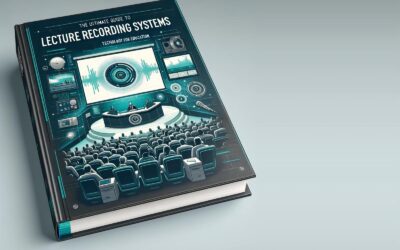Introduction
Lecture Recording System (LRS) have transformed the educational landscape, providing a more flexible and accessible learning experience. They record live lectures, allowing students to revisit lessons at any time, anywhere, which is very helpful in reviewing complex concepts. For students who miss classes due to unforeseen circumstances, LRS ensures they stay up to date with course material. In addition to the students, lecturers benefit from these systems in that they can review and develop their teaching approaches based on recorded content. Increased engagement, retention of knowledge, and better learning outcomes have been recorded since LRS was incorporated into educational institutions.
The adaptability of Lecture Recording System supports different learning preferences: auditory and visual learners alike. Many of these systems also provide features such as searchable transcripts, timestamped annotations, and playback speed control, which further enhance the learning experience. Educational institutions are increasingly adopting these systems as part of their digital transformation strategies. As technology advances, LRS is expected to evolve by incorporating AI-driven analytics, interactive content, and personalized learning pathways, making them indispensable tools in the future of education.
Benefits of Lecture Recording Systems
Enhanced Accessibility and Inclusivity
Lecture recording system ensure that students who cannot attend in-person classes due to illness, disability, or other constraints do not miss out on essential learning materials. By making educational content available on demand, institutions foster an inclusive learning environment.
Flexibility in Learning and Study Optimization
Students can access recorded lectures anytime, allowing them to learn at their own pace. Whether they need to review complex topics, take notes efficiently, or revise before exams, lecture recordings provide immense flexibility.
Supplement to Traditional Learning & Exam Preparation
Recorded lectures act as supplementary study materials that students can refer to for clarification. These recordings enhance comprehension and ensure that students are well-prepared for assessments and exams.
Supporting Distance and Online Learning
With the rise of online education and hybrid learning models, lecture recording systems bridge the gap between remote and on-campus learners. They ensure that students worldwide can access high-quality educational content.
How Lecture Recording System Work
Key Components of a Lecture Recording System
A lecture recording system consists of several key components, including:
- Recording Software: Captures video and audio content
- Microphones and Cameras: Ensure high-quality audio and visual output
- Cloud or Local Storage: Stores recorded lectures for future access
- LMS Integration: Syncs recordings with learning management systems
Software and Hardware Requirements
To deploy a lecture recording system effectively, institutions must invest in:
- High-definition cameras and microphones
- Cloud-based storage solutions
- AI-powered transcription services for accessibility
- User-friendly recording and editing software
Integration with Learning Management Systems (LMS)
Modern LRS solutions integrate seamlessly with LMS platforms like Moodle, Blackboard, and Canvas. This allows students and educators to access recordings, manage content, and analyze engagement metrics.
Automation and AI in Lecture Recordings
AI and automation improve the efficiency of lecture recording systems by:
- Auto-generating transcripts and captions
- Enhancing video quality and reducing background noise
- Enabling keyword-based content search
Choosing the Right Lecture Recording System
Features to Look for in a Lecture Recording System
When selecting an LRS, institutions should consider:
- Ease of Use:The system has to be easily used by all the students as well as their instructors, permitting easy recording and access and easy management of lectures without extensive technical training.
- Scalability: The system should handle increased loads with an even higher number of users without jeopardizing the performance. All these ensure a seamless experience for all the users.
- Security Features: A good LRS must include data protection by offering secure storage and access controls to protect educational content and sensitive information.
- Editing and Annotation Tools: Recording and Annotation editing tools are also a great means of highlighting important aspects, clarifying the presented content, and making training sessions more interesting and engaging.
Cloud-Based vs. On-Premises Solutions
- Cloud-Based LRS: Cloud-based systems provide the flexibility to access lectures from anywhere with an internet connection. Software updates are handled automatically, which reduces the efforts of institutions in terms of maintenance. These systems are ideal for organizations that seek scalability and remote access.
- On-Premises LRS: since all recordings are stored and managed on local servers. However, they require dedicated IT resources for maintenance, regular updates, and hardware management. This option is suitable for institutions that prioritize data privacy and have the infrastructure to support it.
Scalability and Cost Considerations
- Scalable Solutions: Essential for growing institutions
- Budget-Friendly Options: Institutions must assess long-term costs, including licensing and maintenance fees
Best Lecture Recording Software for Universities
Some of the top LRS options include:
- Panopto:Panopto is well-known for its ease of use and powerful features such as live streaming, on-demand video access, and advanced search capabilities. It is very easily integrated with learning management systems (LMS) like Moodle and Canvas, making it popular for universities.
- Echo360:Echo360 offers its features with interactivity, for example, real-time polls or quizzes, which increase the level of student engagement during lectures. Additionally, analytics are given for tracking student participation and performance, which helps teachers adjust their teaching methodologies.
- Kaltura: Kaltura is flexible and can be customized. It supports video creation, editing, and distribution on a wide range of devices. The platform offers integration with major LMS platforms and robust analytics to monitor content effectiveness.
- YuJa: YuJa provides for complete video management solutions, like lecture capture and video editing to content storage, and its ease of accessibility and automatic captioning make it highly suitable for institutes that focus more on inclusive learning environments.
Future Trends and Innovations in Lecture Recording Systems
AI and Machine Learning in Lecture Recordings
Artificial intelligence is enhancing lecture recording systems by:
- Automatically summarizing content
- Personalizing learning recommendations
- Improving speech-to-text accuracy
Interactive and Immersive Learning through AR/VR
Augmented Reality (AR) and Virtual Reality (VR) are revolutionizing how lectures are recorded and consumed. Immersive learning experiences improve student engagement and retention.
The Role of Analytics in Improving Education
Analytics help educators:
- Track student engagement
- Identify learning gaps
- Improve course content based on data-driven insights
The Future of Hybrid Learning and Virtual Classrooms
Lecture Recording System will heavily influence the future of hybrid learning and virtual classrooms. These systems allow educators to deliver content to in-person and online students at the same time, thus creating a consistent learning experience. Through recording and sharing lectures, students can access course materials at any time from anywhere.
LRS also supports interactive elements such as quizzes, annotations, and discussion forums, which encourage engagement in both learning environments. With the evolution of education, the integration of LRS will fill the gap between traditional and digital learning, allowing for greater flexibility and inclusivity for all students.
Conclusion
Lecture Recording System play a very imperative role in current education. Through these systems, students can receive lectures at the most convenient moment for them without having to bother about being available at the specified time for class. It thereby increases their comprehensive and retention qualities of complex content. In so doing, there is no learning left behind across different locations as well as among those with competing schedules. Educators also have advantages through these systems, acquiring knowledge about their teaching in addition to developing engaging content that learners would want to encounter.
In addition, as technology continues to grow, the functionality of LRS will expand into new areas like AI-powered analytics, personalized learning experiences, and immersive technologies, including virtual and augmented reality. In this manner, investing in the right system future-proofs teaching methods to be ahead of digital learning trends. With commitment to innovation and adaptability, colleges and universities can create a dynamic and engaging learning environment to meet the diverse needs of their learners.
Search
Categories
- AI 3
- Analytics & Data Science 16
- Blogs 7
- Brand Identity 22
- Business 10
- CMS & LMS 22
- Development 1
- Digital Marketing 19
- Digital Signage 12
- E-commerce 6
- Education & E-Learning 1
- Enterprise solution 15
- Events 1
- Internet of Things 9
- Mobile App Development 15
- News 5
- Open Source Development 12
- SEO Search engine optimization 2
- Staff Augmentation 1
- Uncategorized 4
- Web Design 1
- Web Development 19
- Web Security and Performance 18
- Website Development 1
- WordPress Development 3






